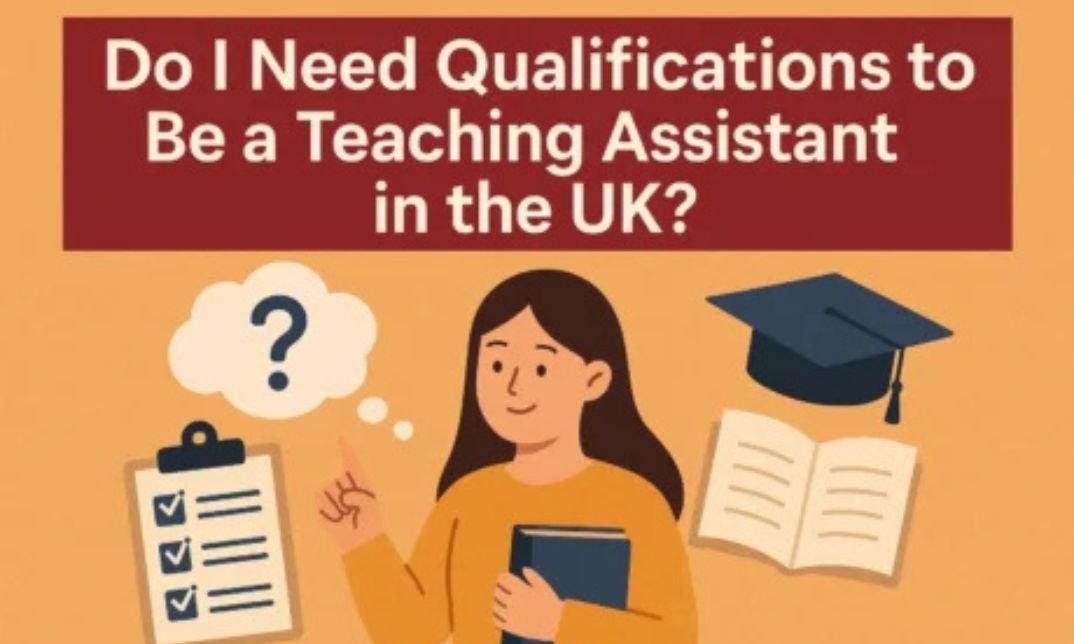No products in the cart.
Teaching Assistants help students learn, ensure everyone feels included, and keep the classroom running smoothly. So, if you’re thinking about how do I become a teaching assistant in England, it’s not as complicated as it sounds. First, check what you need to start and sort out your DBS. Next, pick a Level 2 or Level 3 course, or even a Level 3 apprenticeship. After that, get some school experience and apply to local schools or MATs.
Let’s dive into the steps and see exactly how you can start your TA career.
What Does a Teaching Assistant Do in Schools?
A Teaching Assistant is there to make the classroom run smoothly and support the teacher and the students. Basically, you do a bit of everything. On a typical day, you might:
- Help the teacher with everyday classroom jobs so things run smoothly.
- Work with small groups or spend time one-on-one with pupils.
- Give extra support to children with special educational needs (SEN)
- Get resources ready and keep the classroom organised.
- Supervise pupils during breaks, transitions, or fun activities.
- Update the teacher on how the students are doing.
- Keep the classroom positive and make sure everything goes smoothly.
Why Become a Teaching Assistant in England?
There are plenty of good reasons to become a Teaching Assistant. For starters, you make a real difference in children’s lives every day. Plus, the hours are usually steady, so it’s easier to plan your schedule. On top of that, there’s a clear path to grow—you can start at Level 2, move to Level 3, and even work toward HLTA. And if you want, being a TA can also lead to teacher training. You can work in primary, secondary, or with children with special educational needs (SEN).

What Qualifications Do You Need to Be a Teaching Assistant?
The basics are simple if you want to work as a Teaching Assistant. First, you’ll usually need GCSEs in English and maths (grade 4/C or the equivalent). You also need to be someone who enjoys working with children. Afterwards, you can start with a Level 2 TA course to get your foot in the door. Then, if you want to go further, Level 3 gives you more advanced skills, including working with children with special educational needs (SEN).
How to Become a Teaching Assistant in England with No Experience?
Yes, you can. But remember, it will take a little effort to get started. The good news is that there are some easy ways to build experience. For example, you could volunteer at a local school, help with reading groups or join youth clubs. Also, make sure you have two people who can give you a reference. On top of that, doing a short safeguarding course shows you’re serious and ready to work with children. If you take these steps, you can get into a TA role even without any previous experience.
Do You Need a DBS Check or Safeguarding Training?
Yes, you do, and it’s an important step to start. First, you’ll need an enhanced DBS check, which includes the children’s barred list. Then, when you begin, the school will usually give you a quick safeguarding induction so you know how to keep pupils safe. Also, it helps to gather your ID and right-to-work documents early. Everything will run smoothly, and you can start your TA role without delays.
What Are the Different Levels of TA Courses (Level 2, Level 3, HLTA)?
Teaching Assistant courses are split into levels, so you can learn the basics first and then take on more responsibility as you go.
Level 2 – Supporting Teaching & Learning
This is the starting point, perfect if you’re new. You’ll learn the basics of helping teachers, supporting pupils, and keeping the classroom running smoothly. You’ll also cover classroom routines, child development, and health and safety. Basically, it gives you the confidence to get started.
Level 3 – Certificate, Diploma, or Apprenticeship
Once you’re comfortable with the basics, Level 3 takes it up a notch. You’ll learn to run small groups, help pupils with special educational needs (SEN), and support learning interventions. You’ll also pick up skills in behaviour management, safeguarding and working more independently. Plus, you can choose a Level 3 apprenticeship to earn while you learn.
HLTA – Higher Level Teaching Assistant (Level 4)
For those with some experience, HLTA lets you lead the classroom. You can cover lessons, plan activities, and even guide other TAs. You’ll also help manage whole-class sessions, support learning across subjects and get involved in planning the curriculum. So, if you’re ready for more responsibility or thinking about teaching, this is the next step.
How to Choose the Right Teaching Assistant Course for You
Choosing the right course depends on where you’re starting and what you want to do. If you’re completely new to schools, then a Level 2 course is great way to learn the basics. On the other hand, if you already have some experience or want to work with children with special educational needs (SEN), a Level 3 or a Level 3 apprenticeship is a better fit. And if you’re confident and experienced, going for HLTA lets you take on more responsibility in the classroom.
Also, the course should be recognised by Ofqual or another trusted award body and accepted by local schools. That way, your qualifications really count when you start applying for jobs.
How Long Does It Take to Qualify as a Teaching Assistant?
It really depends on which course you choose. For example, short beginner certificates can be done in just a few weeks. Then, Level 2 or Level 3 courses usually take around 3 to 9 months, depending on how quickly you work through them. And if you go for a Level 3 apprenticeship, it typically takes 12 to 18 months, but the good part is you get to work in a school and learn at the same time.
How to Gain School Experience or Volunteer Hours
One of the easiest ways to get experience is by emailing local schools or MATs with a short CV. Then, let them know when you’re free and what kind of help you can offer. You could support lessons, run reading groups, or supervise lunchtime clubs. Also, keep a record of your hours and ask for references along the way, as they’ll help when you start applying for a TA role.
How Much Does a Teaching Assistant Earn in England?
Most Teaching Assistants are paid based on the local authority’s NJC pay scale. Many contracts are term-time only, so your pay is worked out on a pro-rata basis but usually spread over 12 months. Also, check if there’s extra pay for London or SEN roles.
Here’s what you can expect at different levels:
- Level 1 (Entry Level): Helps teachers with simple tasks. Pay usually starts at about £13.90 per hour.
- Level 2 (Intermediate): Involves supporting small groups or individual pupils. Pay ranges from £14.30 to £15.00 per hour.
- Level 3 (Advanced): Includes helping plan lessons, giving feedback, or running short activities. Pay is around £15.56 per hour.
- HLTA (Higher Level TA): Takes the lead in lessons, covers teachers, or supports pupils with more complex needs. Pay starts at about £16.08 per hour.
So, as you gain experience and take on more responsibility, your pay grows too.
What Skills Make a Great Teaching Assistant?
To be a top TA, you need a mix of skills. Here’s what really matters:
- Good Communication: Being able to explain things in simple words and listen to both students and teachers.
- Patience: Staying calm and supportive, even when things get tricky.
- Teamwork: Working well with teachers and other staff so the classroom runs smoothly.
- Inclusion & SEND Awareness: Understanding and helping children with different needs.
- Behaviour Management: Keeping the classroom positive and focused.
- Basic ICT Skills: Using tech for planning, records or classroom activities.
- Confidentiality: Handling pupils’ information responsibly and keeping it private.
Remember: Give examples of these skills in your application, like helping a pupil improve or working well with a team.
Can You Work as a SEN (Special Educational Needs) Teaching Assistant?
Yes, you definitely can. At the same time, there are a few extra things to keep in mind. For example, it helps to understand conditions like autism or ADHD, use visual communication tools, and support behaviour and sensory routines. Also, doing a short SEN course is smart because it looks good on your CV and shows schools you’re ready to help all pupils succeed.
What Are the Career Progression Routes After Becoming a TA?
Once you start as a Teaching Assistant, there’s a clear path to grow in your career. First, you’ll work as a regular TA, helping in the classroom and getting hands-on experience. Then, you can move up to Senior TA, taking on more responsibilities like leading small groups. After that, you might become an HLTA (Higher Level Teaching Assistant), where you can cover lessons and support teachers more independently. From there, you could specialise in areas like ELSA, behaviour support, or SALT support. Finally, if you’re interested, you could train to become a teacher through QTS, PGCE, or an apprenticeship.
Career Path:
Regular TA → Senior TA → HLTA → Specialist Roles (ELSA / Behaviour / SALT Support) → Teacher Training (QTS / PGCE / Apprenticeship)
As you move up, your responsibilities and pay increase, and each step gives you more experience and opens up new opportunities in schools.
Final Thoughts: Start Your Teaching Assistant Journey with Confidence
If you’re unsure about how do I become a teaching assistant in England, let’s break it down. First, ensure your GCSEs or Functional Skills in English and maths are in order and prepare your DBS paperwork. Next, pick a Level 2, Level 3 or Level 3 apprenticeship course. At the same time, line up two references and start building some volunteer hours. Then, apply to 3 to 5 local schools or MATs. By following these steps, you’ll be ready to make a real difference in the classroom.
Start your journey today by enrolling in the Teaching Assistant Course at the Open Learning Academy and gain the skills you need to succeed.
FAQs
What qualifications do you need to be a teaching assistant in the UK?
You usually need GCSEs in English and maths (or equivalent). Many TAs take a Level 2 or Level 3 TA qualification to start or advance.
How long does it take to become a teaching assistant in the UK?
Short beginner courses take a few weeks, Level 2 or 3 courses usually 3–9 months, and a Level 3 apprenticeship about 12–18 months while working.
Can I be a TA with no experience?
Yes. Volunteering at schools, youth clubs, or reading groups, as well as completing a short safeguarding course, can help you get started.
What is a TA salary in the UK?
Entry-level TAs start around £13.90/hour. Experienced TAs earn £14–16/hour depending on level and responsibilities, with HLTA roles paying higher.
Why are schools getting rid of TAs?
Some schools reduce TA numbers due to budget cuts or shift towards teaching-led support, focusing resources on classroom teachers.
How to train to be a teaching assistant?
You can take Level 2 or 3 TA courses or a Level 3 apprenticeship. Gaining school experience and completing a DBS check are also required.
Can I do a teaching assistant course for free?
Some online providers or government-funded programs may offer free courses, especially for unemployed people or apprenticeships, but most recognised Level 2/3 courses have a fee.




